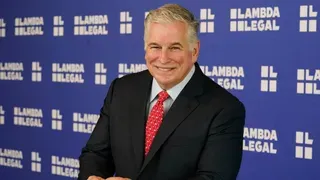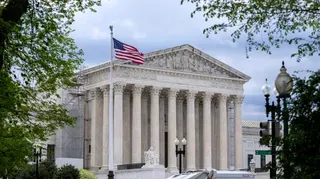March 7, 2012
Romney, Santorum Show Ohio GOP Ideological Divide
Jason St. Amand READ TIME: 4 MIN.
Moderate, secular and well-educated people propelled Mitt Romney to victory in Ohio's Republican presidential primary on Tuesday, an exit poll of voters showed. Rick Santorum drew robust support from the state's most ardent conservatives and eked out a modest margin among the working class, whom he has targeted in his drive to slow Romney's march toward the GOP nomination.
Ohio was the most closely watched of the 10 states holding Super Tuesday presidential contests. With many viewing it as one of Santorum's best chances of emerging as the singular challenger to Romney, the two men essentially carved the state's party into competing ideological halves.
In two states where Santorum triumphed, Oklahoma and Tennessee, Santorum was buoyed by voters who said their choices were influenced by religion, the exit polls showed.
More than two-thirds of voters in both of those states said a candidate's religious beliefs were important in their decisions. Santorum, the former Pennsylvania senator, has frequently described his Catholicism and the role it has played in his life.
On a night on which Santorum and Romney traded victories across the map, there was a potentially ominous sign for the GOP as voters signaled only lukewarm attachment toward even their own candidate.
Only in three states did most people say they strongly supported the contender they backed, peaking at 60 percent saying so in Oklahoma. In the four remaining states where polling was conducted Tuesday, fewer than half expressed that intensity of support for their candidate, bottoming out at 40 percent in liberal-leaning Vermont.
In Ohio, Santorum won 48 percent of voters considering themselves very conservative, far more than Romney, doing especially well with people who are conservative on social issues like gay marriage. He also did strongly with born-again and evangelical voters, and took 53 percent of those saying it was very important that they share religious beliefs with their chosen candidate - more than Romney and Gingrich combined.
While Santorum spent much of his campaign seeking to cement bonds with working-class voters by citing his upbringing in Pennsylvania coal country and stressing U.S. manufacturing, he bested Romney by just 39 percent to 34 percent among people without college degrees - a common measurement for the blue-collar vote.
Romney won among all but the most ardently conservative voters in Ohio, including getting over 4 in 10 moderates and liberals, and easily carried those who are not born-again Christians. He captured 52 percent of those saying they want a candidate who can defeat President Barack Obama this fall, and led among the majority of voters saying the economy is their most important issue.
The one-time Massachusetts governor also prevailed among college graduates, senior citizens and people from families earning over $100,000 annually.
Santorum's Oklahoma win was fed by a roughly 15 percentage point advantage among those religiously oriented voters over both Romney and Newt Gingrich, the former House speaker who was struggling to keep his candidacy afloat. In Tennessee, Santorum's lead over those two men among people looking for a religious match with their candidate was nearly 2-1.
Another Santorum source of strength in Tennessee came from blue-collar voters, who gave him modest but clear margins over his competitors. He ran about evenly with Gingrich among those voters in Oklahoma but ahead of Romney.
One of Romney's chief selling points is his assertion that his business background gives him expertise on handling the economy, but Tennessee and Oklahoma voters gave him little credit for that. Romney and Santorum ran about evenly among Tennessee voters who consider the economy the top issue, while Oklahomans focused on the economy gave Romney only a small advantage over Santorum and Gingrich.
The campaign's persistent criticism of Romney's wealth and background as a private equity executive may be hurting him, the exit surveys showed.
Asked in Ohio and Tennessee which candidate best understands the problems confronted by average Americans, Romney scored poorly. Around a third in each state picked Santorum while only about a fifth named Romney.
In Massachusetts, Romney performed strongly among all types of voters.
But that state's GOP voters expressed displeasure with the health care coverage program enacted while Romney was governor, with 51 percent saying the measure had gone too far. Romney has been criticized for that plan by his GOP rivals and has pledged, if elected, to repeal Obama's national health care overhaul, which resembles Romney's Massachusetts measure.
In Georgia, the exit poll showed the victory there by Gingrich, who represented the state in Congress for two decades, was propelled by people saying the former speaker's ties to the state were important.
Gingrich won 78 percent of the votes of Georgia Republicans saying his relationship to the state affected their vote, according to the survey.
Around 6 in 10 said his Georgia roots mattered little to them, and those voters were divided roughly evenly among Gingrich, Romney and Santorum.
In Vermont, Romney did strongly among rank-and-file Republicans. Texas Rep. Ron Paul ran solidly among the 4 in 10 independent voters.
In Virginia, where only Romney and Paul were on the ballot, Romney performed strongly across most categories of voters.
On two subjects, voters in each of the states Tuesday had the same view.
Given a choice of four issues, Republicans in every state named the economy as the one that most concerns them. Given four qualities to look for in a candidate, the one cited most often was an ability to defeat Obama in November.
The Ohio survey was conducted for The Associated Press and the television networks by Edison Research as voters left 40 selected polling places in the state. The Ohio poll involved interviews with 2,728 voters and has a margin of sampling error of plus or minus 3 percentage points.
Edison Research also conducted interviews at randomly chosen polling places in Georgia, Massachusetts, Oklahoma, Tennessee, Vermont and Virginia.







